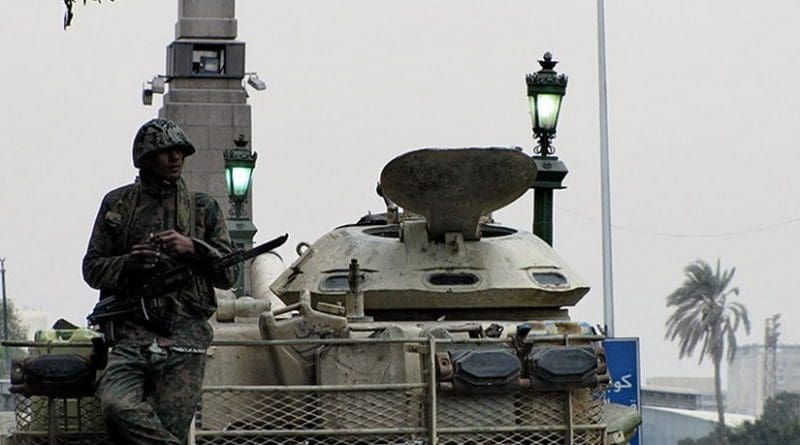A Fork In The Road For Egypt’s Revolution – Oped
By Arab News
By Osama Al Sharif
Egypt’s revolution is alive and kicking but it is also careening in a tumultuous sea of chaos and uncertainty. Friday’s ransacking of the Israeli Embassy in Cairo may have struck an emotional chord with millions of Egyptians, but it also underlined the confusion, frustration and lack of direction that is gripping both the country’s transitional rulers and the majority of Egyptians.
It took hours for security to be restored in the area around the besieged embassy, but not before three persons were killed and hundreds injured in the ensuing clashes. The storming of the embassy drew condemnation and criticism from Israel, the United States and from many Egyptians who accused pro-Mubarak infiltrators of burning police stations and inciting the public. It was a big embarrassment to the government of Essam Sharaf who tendered his resignation as a result to the ruling military council. It was rejected.
In response to Friday’s incidents Head of the Supreme Council of the Armed Forces (SCAF), Field Marshall Mohamed Hussein Tantawi, announced the reactivation of the controversial Emergency Law, a hated symbol of the toppled regime’s repressive rule. This enraged youth movements and activists who have repeatedly expressed suspicions of SCAF’s motives and agendas. On the other hand a growing number of Egyptians are dismayed over the rampant state of lawlessness that has afflicted the country since the former president was ousted. Others, including leftist parties, are fearful of the growing influence of hard-line groups, especially the Muslim Brotherhood and the Salafis.
The fate of the presidential and legislative elections, slated to be held in October, now hangs in the balance. The youth movement itself, the driving force behind the Jan. 25 revolt, is showing signs of division with some activists calling for a resumption of protests, and even armed struggle, to force the hands of the military. Even moderate pundits have called on Prime Minister Sharaf to resign because, in their view, his government had failed to live up to expectations.
It’s not a pretty picture and the euphoria that had engulfed the historical triumph of the revolution is quickly dissipating. But it would be naïve to say that today’s reality has come as a surprise. Egyptians were once united in their hatred and frustration, not to mention their trademark cynicism, of the Mubarak regime and its cohorts of influential businessmen and politicians. They rose together, on an impulse, against the president and his corrupt regime. They challenged authority and battled with hoodlums and anti-riot police. They occupied Tahrir Square and mesmerized the world with their peaceful protests. Many died and many more were injured until the struggle paid off. But the idealistic dream of building a free and democratic Egypt faces challenges.
Power was transferred to the military, an establishment that had ruled Egypt without contestation for decades. Mubarak has been toppled and his ruling party dissolved, but the power base that has governed the country since 1952 remained intact. The fall of Mubarak freed the only viable opposition, with grassroots support across the country of 88 million, which is the Muslim Brotherhood. Other variations of hard-line movements, such as the Salafis, also emerged on the political scene.
The popular revolution, triggered in the realms of social media virtual universe by mostly middle class youth, had landed in the real Egypt comprised of military old guard, powerful hard-line groups, bands of leftist and nationalist parties, and influential remnants of the ancient regime. The lofty goal of steering the country toward a secular, democratic, multi-party prospect was becoming disjointed.
Like other uprisings in Tunis, Yemen, Syria and even Libya to a certain extent, Egypt’s was a headless and leaderless revolt. It was a popular movement that rallied around an immediate mission; to bring down the president, but once that goal was achieved it began to lose sight of its final destination.
There are three powerful players today on the Egyptian scene: The military which maintains legitimacy in spite of growing public discontent, the hard-liners who have demonstrated their influence, organization and political shrewdness and finally there are the counterrevolutionaries; those who benefited from the Mubarak regime for years and are now fighting to derail the revolution.
Egypt’s rebellious youth continue to wield some authority, but they are splintering and for a growing number of conservative Egyptians — many of whom are suffering from revolution fatigue — all they want now is a return to normalcy and public security. They see protesters as a nuisance and as a threat to the country’s economic recovery. The youth are quickly losing credibility in the street.
Revolutions have a weird way of veering off course. It’s the rule rather than then exception, and Egypt today is going through a major shift in direction. The military will now seek to assert its authority and may decide to stamp down on public protests at any cost in the name of national security. It is likely that in the process SCAF and the Muslim Brotherhood will strike a deal accommodating both sides’ ambitions. And in the midst of all this pro-Mubarak followers may also get some concessions.
Revolutions are usually driven by idealistic objectives, but in a complex world or vicious power play most of these cherished goals are sacrificed. Egypt is a case in point. It’s a side of the Arab Spring that is now becoming a reality.
— Osama Al Sharif is a political commentator and journalist based in Amman.

